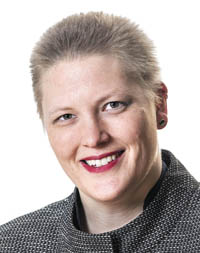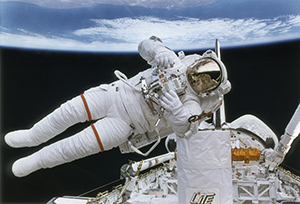
Space films nurture research
Both science fiction and space research seeks answers to the big questions. However, scientists seem to have much greater confidence in the future than filmmakers.
This was the case when Sandra Bullock was struck by space debris in the thriller, Gravity, and so it is again with Ridley Scott's upcoming blockbuster film about astronauts' life on Mars , says Anna Åberg, researcher at the Department of History of Technology at KTH.

"Obviously NASA wants to contribute a scientific perspective. One wants the films to provide as accurate a factual picture as possible. As a bonus, it can have other positive effects, such as inspiring filmmakers about ideas that you are passionate about. And, on a general level, it can strengthen the common man's interest in space exploration."
Åberg says NASA's increasing interest in film coincided with budget cuts the agency experienced, due in large part to the end of the space race — and Cold War — between the US and USSR. By engaging cinema audiences, NASA hopes to strengthen support to offset the cuts in the space program.
"Few other disciplines have earned so much in the film industry as space research," she says. "Science fiction adventures both inspire new developments and generate popular support for resource-intensive research."
Violence and conflict sells better
But above all, space science and science fiction films generate their appeal with the big existential questions that both seeks to answer, Åberg says. Where did life begin, and where will it end? Are we alone in the universe? If there are other beings, are they threatening?

While science has a positive or neutral approach — to push the boundaries and find new materials, discover and explore new places and living conditions — the tone for science fiction films is often dystopian, focusing on impending disasters and threatening strangers.
It is not so surprising, Åberg says. The logic of the film industry is that violence and conflict sell better.
"To paint the pessimistic scenario serves as a way to process our fears and to prepare us for what may happen in the future," she says.
Important role of democracy
Films' advanced and imaginative technologies influence both laymen and experts in very tangible ways. For example, human robots in the movies, or cyborg characters like Terminator, impact on public attitudes to prostheses in health care, according to surveys Åberg has done. On the other hand, prosthetic scientists, astronauts and space scientists in general attest to the influence of sci-fi movies in their career choices, she says.
How do influences usually work out? Is it the movies go first and then science follows?
"No, it is rather an interaction that can be difficult to sort out. Both serve and benefit from each other. Moreover, there are researchers who are also science fiction writers, and that is perhaps a good idea of how the relationship looks."
The films also fulfill an important function as a catalyst in community discussion she says. Research-critical debates followed in the wake of cyborg films, addressing such issues as the fear of robots becoming super soldiers in future wars.
"High-tech solutions are part of society, but the technology both solves and creates problems. Fiction is based on what is already there, and plays off of that. If a film invites a discussion on the future use of technology, then it plays an important role in the democratic discussion."
Some years ago, Åberg KTH introduced a course, "Science goes fiction," about fiction's significance for technological science.
"Fiction is one of the most important platforms for interaction between scientists and the public, because it is also important for students to gain insight into the issue."
Christer Gummeson